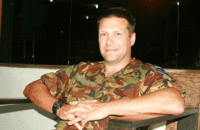Cecily McNeill
10 August 2011
Timor-Leste has transformed from a country whose towns were empty of people – the citizens traumatised by violence and bloodshed 12 years ago – to a vibrant young nation with numerous signs of hope, according to a New Zealand Army commander, in Dili for a six-month duty.
August 30 is the 12th anniversary of an overwhelming vote for independence which sparked a violent reaction from the Indonesians who had occupied the country for 24 years killing a third of the population in a bloody invasion in December 1975.
 Major Andy MacKenzie Everitt was first in East Timor in May 2000 just eight months after Indonesian militia attacks on the Timorese which included a brutal massacre in the Catholic Church in Suai near the border with Indonesian West Timor. When Major MacKenzie Everitt’s battalion arrived the situation was relatively calm, perhaps dampened down by a month of heavy flooding.
Major Andy MacKenzie Everitt was first in East Timor in May 2000 just eight months after Indonesian militia attacks on the Timorese which included a brutal massacre in the Catholic Church in Suai near the border with Indonesian West Timor. When Major MacKenzie Everitt’s battalion arrived the situation was relatively calm, perhaps dampened down by a month of heavy flooding.
‘As the situation dried out, what we found was a militia group moving from West Timor through the district of Covalima, into Cassa further east. So they were transiting through our zone and en route they were literally terrorising some of the villages in the hinterland – in the foothills of the high mountains. The Timorese appealed to us for help.’
The New Zealand soldiers were part of a United Nations peacekeeping force, UNTAET – there to provide security – ‘to create a stable environment but also for governance and public administration, humanitarian assistance and disaster relief’.
‘We were having difficulty resupplying our own troops who, by this stage, were up in the hills. The conditions were pretty rough.’
Tamping the violence The New Zealanders decided to take a slightly different, ‘more ambitious’ approach to tracking down the militia than the usual checkpoints and static security details. They worked with the local security service – an armed neighbourhood watch – to amass information revealing the whereabouts of militia groups and then disarmed and arrested them.
The New Zealanders decided to take a slightly different, ‘more ambitious’ approach to tracking down the militia than the usual checkpoints and static security details. They worked with the local security service – an armed neighbourhood watch – to amass information revealing the whereabouts of militia groups and then disarmed and arrested them.
The unprovoked killing of Private Leonard Manning while on peacekeeping patrol on July 24, 2000, was a tragedy that brought matters to a head. Manning was the first New Zealander killed in a wartime situation since Vietnam. His killing shocked his comrades who were lucky to escape with their lives. ‘We were surprised. The militia had not been that aggressive towards us but obviously they felt threatened by us. It was a very sad event.’
The New Zealanders made an armed response ‘in accordance with our mission – I will stress that we acted lawfully in full support of the local population.’
It was now clear the militia were not going to leave quietly so the Kiwis worked with the locals to set up a network of observation posts and finally succeeded in intercepting various armed groups. ‘We ended up killing three of the militia in three separate incidents over the subsequent six weeks and by doing so – unfortunate but we had to do it – we sent a very strong message.’
The independence-minded Timorese wanted to absolutely prevent the politically-orchestrated violence coming from Indonesian West Timor. ‘There was a new international border – we defended it on behalf of the people of East Timor and proudly so – we put ourselves in harm’s way for the greater good.’
Major MacKenzie Everitt says the militia the Kiwis met were disciplined soldiers, well trained and well equipped, ‘and they moved very well across the country, far easier than we did on those minor tracks’. But he could not comment on whether they were taking orders from the Indonesian military government or acting on their own volition.
A rapid change Today the country is thriving with a large international presence including from the former colonisers, Portugal. Timor-Leste’s official language is now Portuguese and this country has contributed a rich heritage in its cuisine, legal framework and religion (98 percent of the population is Catholic).
Today the country is thriving with a large international presence including from the former colonisers, Portugal. Timor-Leste’s official language is now Portuguese and this country has contributed a rich heritage in its cuisine, legal framework and religion (98 percent of the population is Catholic).
Some of the battered houses on the hills in Suai have not been reoccupied – these probably belonged to the Indonesian clerical class and they are not welcome back. But Major MacKenzie Everitt observes that the unpopular colonisers at least ran an efficient infrastructure – the roads are now worse with potholes everywhere and the electricity and schooling systems worked better under Indonesian rule.
The many challenges facing this tiny nation, with a life-expectancy of just 60 and only half of adults able to read and write, may crystalise next year with parliamentary elections. Major MacKenzie Everitt did not want to comment on the challenges ahead but suggested that the sign of a successful democracy would be free and fair elections with any violence kept to a low level.